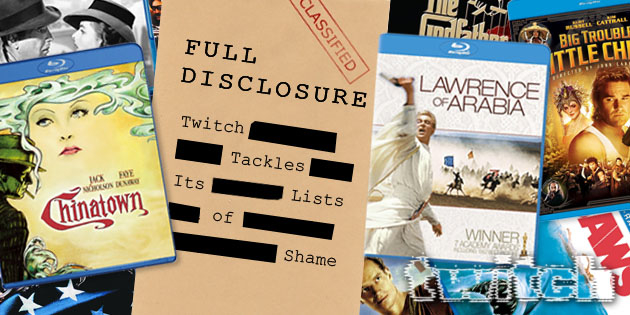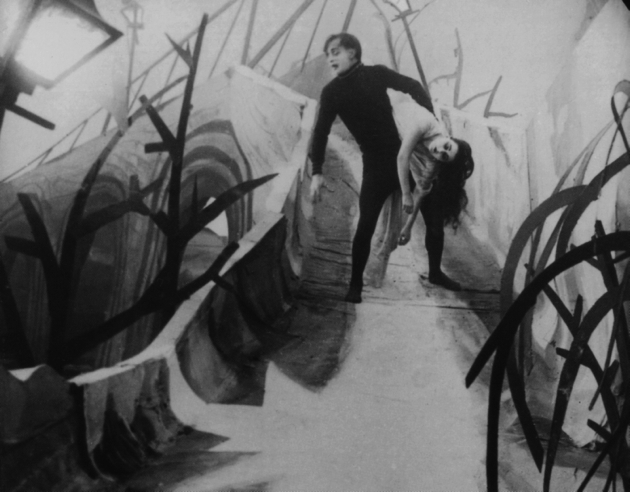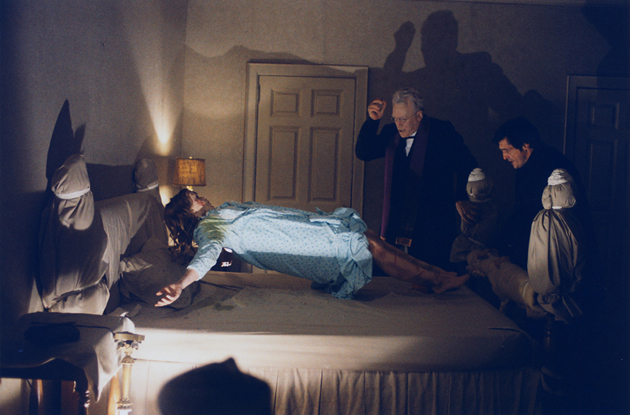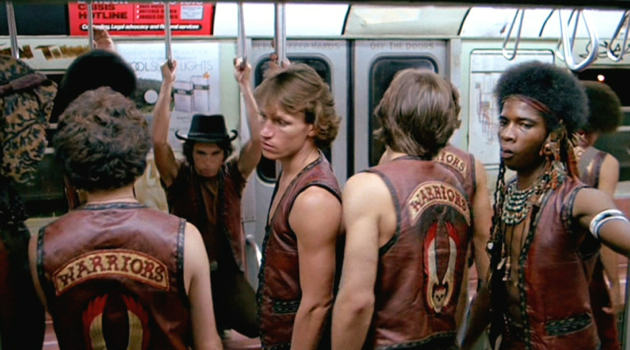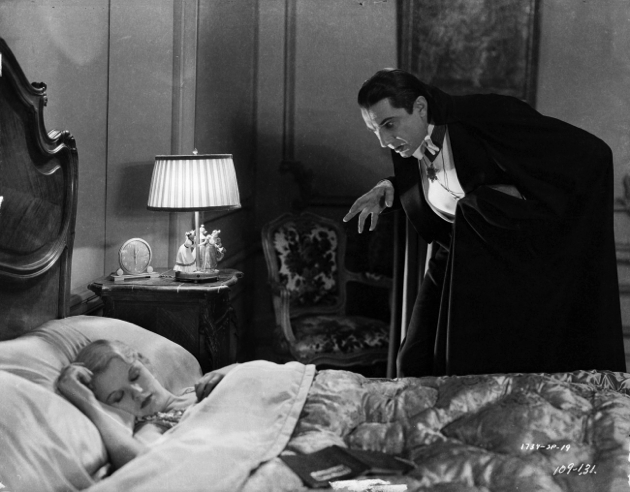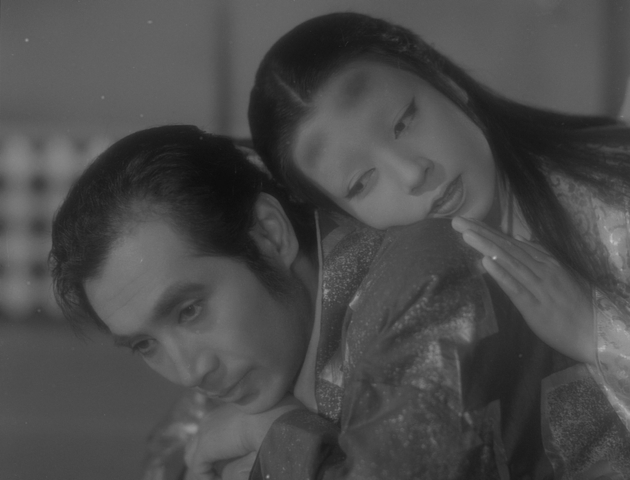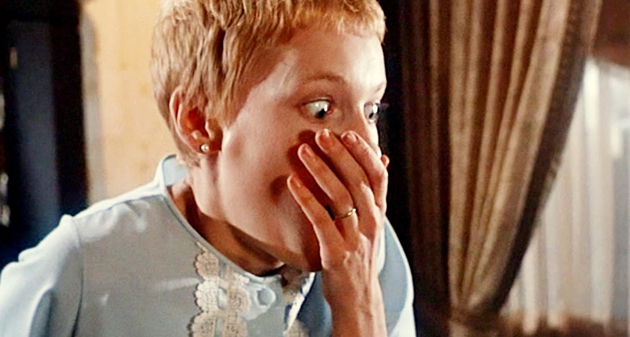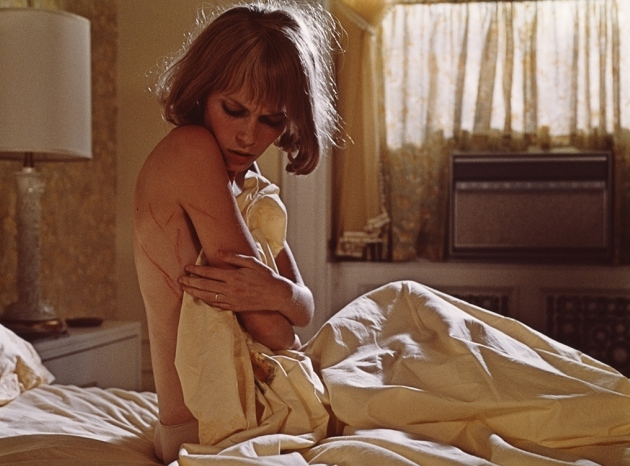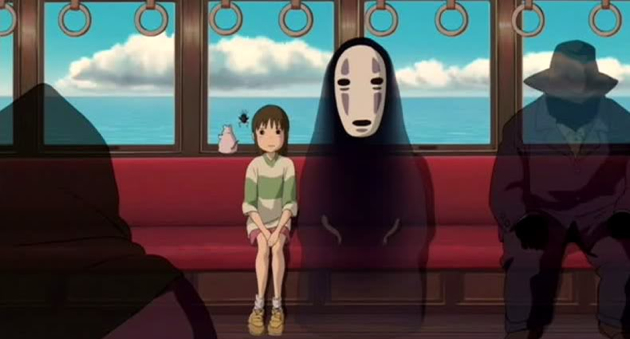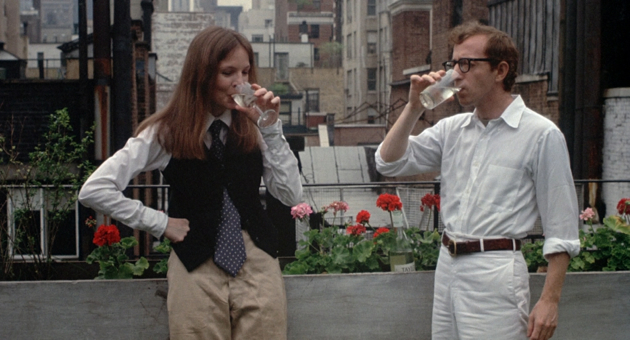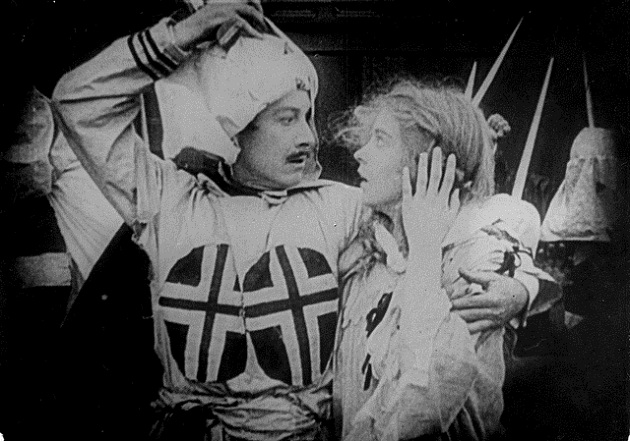Full Disclosure: ScreenAnarchy's Lists Of Shame - October
Peter Martin, Ryland Aldrich, Benjamin Umstead, James Dennis, Kurt Halfyard, Niels Matthijs, Ernesto Zelaya Miñano, Shelagh Rowan-Legg and Ard Vijn
contributed to this story.











The Cabinet of Dr. Caligari (dir. Robert Wiene, 1920 Germany)
Peter Martin, Managing Editor:
Lively ideas, monumental production design, and a neat ending propel the film through the slow spots, of which there were more than I anticipated. But bearing in mind that filmmakers of that era were still learning how to shake off the boundaries of stage productions and take advantage of the new medium - Fritz Lang's Harakiri, made the year before, is similarly stagy and stiff - that's a relatively small price to pay, in view of the grandly expressionistic sets and the implicit horror expressed through the titular character.
This isn't the most compelling silent movie "classic," yet it's a reminder that horror movies needed to stand upright on their own two bent legs before they could run, and its influence stretches down to this day. I'm not quite sure why I avoided watching it until now, other than time and circumstance, and perhaps its reputation as more of a history lesson to be studied than an entertainment to be savored. History lesson or not, its cinematic educational value cannot be denied.
The Exorcist (dir. William Friedkin, 1973 USA) Winner of 2 Acamdey Awards, including Best Adapted Screenplay and Best Sound, Winner of 4 Golden Globes, including Best Picture - Drama and Best Director
Ryland Aldrich, Festivals Editor:
A fitting October entry and the final film in my "shamefully unseen horrors" subsection, William Friedkin's possession classic was quite possibly my favorite of the three (The Thing and Friday the 13th the other two). After some back and forth about which version to watch, I eventually settled on the original. The inevitable result being I was left constantly wondering if 'this edit' or 'that cut' was different in the Director's Cut. I suppose I'll just have to watch that version soon.
The story itself was more of a slow burn than I expected. Surprisingly enough, I actually preferred these dramatic sections more than the more classic horror elements. I had to remind myself a few times that there was a projectile vomiting girl yet to come. The film is heralded as a benchmark in special effects makeup and some of the fun is taking the trip back in time to when these practical effect were king. Even more impressive is the cinematography by Owen Roizman that is packed with that classic 70s look. Perhaps it doesn't hold up as the kind of horror that would pack theaters today, but the film is a Hollywood gem and well worth a watch.
The Warriors (dir. Walter Hill, 1979 USA)
James Marsh, Asian Editor:
More than most films on my list, I have always been rather ashamed of never seeing Walter Hill's hugely influential street gang flick before now. Perhaps it was because it figured more prominently in pub discussions, prompting me to fall silent, take a trip to the bar, or otherwise disguise the fact I had never savoured Walter Hill's breakout feature more often than some of the others on my list.
Now that I have seen The Warriors, I am left with rather mixed feelings. The film is almost exactly what I expected it to be, and therefore proved something of an anticlimax. Clearly it helped influence and shape a generation of gang flicks and action thrillers throughout the 80s, while informing the seedy New York City aesthetic that was a mainstay until the end of the decade. It was also fun to see familiar young faces like James Remar and David Patrick Kelly making their mark in early roles.
Beyond those historically interesting elements, however, the film struggles to fully entertain when seen with fresh eyes in the wake of all that has come since. Its spirit of defiance, survival and the desperation to be recognised remain strong, but today The Warriors feels more like a transitional point between Kubrick's A Clockwork Orange and John Carpenter's Escape From New York than anything more significant.
That said, the parade of gang colours, fashion choices and other outlandish forms of self-expression make it easy to see why The Warriors meant so much to so many during their formative years. This only further fuels my own personal disappointment in not engaging with the film at a time when I was searching to establish and fully understand myself.
Dracula (dir. Tod Browning, 1931 USA)
Ben Umstead, East Coast Editor:
Having not seen Tod Browning’s seminal take on the vampire has nothing to do with a disinterest in the Nosferatu myth. Far from it actually. I adore F.W. Murnau and Werner Herzog’s films of that name, as well as George A. Romero’s Martin and Claire Denis’ Trouble Every Day, not to mention Let The Right One In. What it has to do with is, frankly, my boredom with most American productions of the early sound era.
Appreciating and understanding that context and where the medium was at with a new technology is one thing, but being entertained and engaged is another thing entirely. So how did I fair?
The vampire’s relation to sex is always an important element of the myth. What I found interesting here was the film’s patriarchal bent on class and sexism. Bela Lugosi’s affluent, suave Count is such a staple now in pop culture as to be seen as something of a cliche and a joke, but no doubt there are some evocative moments in the film, and that is in large measure due to his near literal mesmerizing performance. The production design from John Hoffman, Herman Rosse and Charles D. Hall certainly lend to the Gothic atmosphere, but I still prefer Murnau’s take on the vampire, mainly because I think it's actually scary... which is rare for me with any horror film from any era.
Ugetsu Monogatari (dir. Mizoguchi Kenji, 1953 Japan) Winner of the Silver Lion for Best Director and Pasinetti Award at the Venice Film Festival, Nominated for the Academy Award for Best Costume Design
Ard Vijn, Contributing Writer:
From the moment I became interested in international Cinema, I've been aware of this country called "Japan". After having seen the Shogun television series aged ten, I was hungry to see more of that exotic history. Then I saw Kurosawa's Seven Samurai, and that ensured I'd never be stopped by labels like "decades-old" or "black and white".
Several of the films on my List of Shame this year turned out to be old and in black and white, and turned out to be my happiest surprises this year. So I was glad to see the next film on my list was Mizoguchi's renowned Ugetsu Monogatari, and when I announced to friends this one was next, I got told to prepare myself for basically one of the greatest works of cinema ever. Well...it didn't quite hit me as hard as, say, Shindô's Onibaba or Kobayashi's Harakiri (my first "shame" film this year, incidentally), but it is undoubtedly an incredibly beautiful film.
In what seems to be a simple humanist morality tale, Mizoguchi shows two men who leave their wives and learn to regret it, but there are several added layers and gentle stings clouding the issue. For starters, the men's wildly ambitious plans succeed, so trying to pinpoint exactly where things go awry becomes more interesting than was initially obvious. Did they stray too far from their paths, or did they stay on them too long? Should both men not have shown any ambition at all? But even without these questions, Ugetsu Monogatari works great on an emotional level. It is a moving film, with beautiful photography and magical elements. So even if I don't love it like crazy, I'm still very fond of it.
Rosemary's Baby (dir. Roman Polanski, 1968 USA) Winner of the Academy Award and Golden Globe for Best Supporting Actress, Winner of the David di DonatelloAwards for Best Foreign Actress and Best Foreign Director
James Dennis, Contributing Writer:
When exploring my initial fascination with the horror genre many years ago, Roman Polanski's Hollywood debut appeared to me, for want of a better word, dull. At least, I could always find something a little more gaudy or brash to satiate my budding interest in all things threatening. Its reputation was as a slow-burn chiller; a psychological thriller where not much really happens. Now, where's Bad Taste (1987), I thought to myself...
Ironically, upon finally watching Rosemary's Baby, the parts that bothered me were when things all got a little too William Castle (this being his most mainstream production, before falling back into B movies). Specifically I'm talking about the 'impregnation scene', where glowing eyes and rubber claws make an appearance, and that hammy denouement. What makes it, for the most part, such a creepy and alarming picture is the ambiguity of Rosemary's plight and the subtleties of Polanski's direction. For much of the film we're left to question whether there is indeed any plight at all, as her paranoia crescendos. It's a testament to the skill of those involved that even when the evidence suggests so strongly that something truly sinister is going on, we still question whether it's Rosemary's sanity that's cracking.
Farrow and Cassavettes are mesmerising as the central young couple; their arguments and affections are painfully authentic at times. Farrow also makes a believably grim transformation from sprightly 60s trendsetter to psychiatric patient. I loved the look too; the fashions, Polanski's uneasy gaze and the neo-gothic design. Then there's the inimitable Ruth Gordon, plus Tony Curtis in a literally phoned-in cameo.
In keeping with its status as a chiller, I was creeped out, alarmed and extremely anxious for much of the film, though perhaps not exactly scared. I'm glad I waited until now to watch this - as a kid it would have been wasted on me.
Rosemary's Baby (dir. Roman Polanski, 1968 USA) Winner of the Academy Award and Golden Globe for Best Supporting Actress, Winner of the David di DonatelloAwards for Best Foreign Actress and Best Foreign Director
Kurt Halfyard, Contributing Writer:
For some unfathomable reason, it took me a long time to get to Roman Polanski’s American debut, despite having seen nearly all of his earlier and later work. Was it the fame, or the already spoiled nature of the film, due to its iconic place in popular culture? Not really, as in the first few moments of the film, there are enough portent signs and signifiers to make M. Night wince. Waiting for the eventual reveal is a painful kind of bliss with only the soothing balm of Ruth Gordon and Sidney Blackmer’s performances, both goofy and slick (respectfully). I find it difficult to find fault with this rather unique approach, and things do go out with a hell of an ending.
But really, the first 15 minutes of the film is where it is at. That ‘seeking’ pan across the New York City skyline set to an off-kilter lullaby version of Que Sera Sera. Score rather than song is absent the lyrics and inspires dread rather than hope, but the question is nevertheless, “when I was just a little girl, I asked my mother what I would be...” The answer, is apparently the mother of Satan. If Doris Day can belt that song out in Hitchcock’s The Man Who Knew Too Much, surely it can be subverted here as an anthem for the woman who knew too little, too late.
I took a huge amount of pleasure in noir-staple character actor Elisha Cook Jr. fastidiously showing off the grand old apartment (of spook central) to the young married couple. His question - and the first actual line of dialogue in the film - is whether John Cassavetes’ character is a Doctor or an Actor. The film will feature many doctors (and more than a few midwives) who are indeed more actors than doctors. A stray scrap of paper is shown belonging to the former, quite deceased, owner of the apartment whose last act was to block a closet door on the thin shared wall of her creepy and nosy neighbors with a heavy wardrobe. It reads “I can no longer associate myself.” Perhaps a hint of Mia Farrow’s soon-to-be overwhelming paranoia and powerlessness. A magazine cover will later query, “Is God Dead?” Never has a film so front-loaded its purpose only to then draw out and tease the audience for nearly two hours as surely as Farrow’s body (and hairdo) slowly withers away. But then that kicker of a climax is as surprising as it is inevitable. This is Cinema of Masochism made with exquisite craft - and so many great Polanski films would follow.
Spirited Away (dir. Miyazaki Hayao, 2001 Japan) Winner of the Academy Award for Best Animated Feature, Winner of the Goden Bear at the Berlin Film Festival, Winner of 4 Annie Awards including Best Animatated Theatrical Feature
Ernesto Zelaya Minano, Contributing Writer:
Anyone who spent their childhood raised on Disney movies (like me) has a pretty general idea of what an animated film is. They barely last an hour and a half. They’re quickly paced, They have simple stories about good and evil, where bad guys and good guys are clearly defined. They have cute animal sidekicks who sometimes talk. And songs by Elton John.
Miyazaki Hayao’s films are something else entirely. Previously, I tried watching Princess Mononoke at the tender age of 16, when I still knew nothing about movies, and found it too dense and slow-paced for what I was used to. Now, with more experience (and patience) under my belt, I watched Spirited Away, and was reminded of the real potential of animated films. This is truly a movie for the entire family: kids will love the cute and bizarre creatures, and adults can get swept up in young Chihiro’s quest inside the spirit bathhouse.
Miyazaki has been called the Japanese Walt Disney, and it’s easy to see why: there’s a real sense of child-like wonder in the film, that great feeling of discovering a whole new world, one filled with frogs in kimonos, giant ducks, monks who transform into dragons (which resemble Falkor from The Neverending Story), giant babies, crotchety old men with eight arms, and plenty more weirdness.
Credit Miyazaki for not dumbing things down either: it’s a simple story but complex at the same time, drawing on Japanese myth. It takes its time in telling its tale; most kids I know would probably have switched off at the half-hour mark, or after be traumatized by that grotesque No-Face devouring everyone.
I have to admit to getting routinely lost and wondering what exactly was going on (example: how does Chihiro know the dragon is actually Haku?), but that’s mostly my lack of experience with Miyazaki’s work. It’s still a great and highly detailed feast for the eyes – if all of this was done with traditional hand-drawn animation, consider me impressed.
Also, it was really funny to see Vic Mackey as Chihiro’s Dad.
Annie Hall (dir. Woody Allen, 1977 USA) Winner of 4 Academy Awards inclucing Best Picture and Best Director, Winner of the Golden Globe for Best Actress - Musical/Comedy and Winner of 5 BAFTAs including Best Film and Best Director
Niels Matthijs, Contributing Writer:
Even though Annie Hall is considered one of Woody Allen's best films, somehow I never got around to watching it before (for the record, this was my 9th Allen). It's not that I dislike Allen' films, but I feel it's best to spread them out as his neurotic, often presumptuous style of filmmaking can get on my nerves when consumed in great quantities.
The first half hour of Annie Hall pleasantly surprised me. Even though I'm familiar with Allen's tricks by now (characters speaking directly into the camera, Allen's chaotic conversations and voiceovers, his nerdy behavior and his somewhat awkward chick magnet roles), it still felt fresh and exciting. Sadly the second half hour is a bit too repetitive for my taste, somewhat surprisingly the third and final 30 minutes fall pray to more traditional comedy pitfalls (ie more traditional structures, more drama, less comedy). I hadn't quite expected that after the sprawling first hour.
For me the most interesting scene of the film is where Allen is getting annoyed by the ramblings of an overzealous film fan in a cinema queue. I do share Allen's grief, yet it is something that I often find oddly applicable when watching Allen's own films. I'm not sure if this is a bit of introspective filmmaking on Allen's side (resulting in shameless self-critism) - somehow that doesn't really fit with the image I have of Allen - but it makes for a pretty poignant scene nonetheless.
All in all I enjoyed Annie Hall, I just don't see it as the big masterpiece many others seem to.
The Birth Of A Nation (dir. D.W. Grifith, 1915 USA)
Shelagh M. Rowan-Legg, Contributing Writer:
Nearly 100 years after its release, I don’t think it’s possible to watch D.W. Griffith’s silent film about the US Civil War without a certain bias. At the time, it was considered groundbreaking for its use of panoramic long shots, still shots, pans, night shooting, as well as its sheer length (just over 3 hours, still considered long today). Its subject matter, or perhaps more accurately, its extremely negative portrayal of African Americans, narrative sympathy for the South, glorification of the Ku Klux Klan, and use of white actors in blackface is pretty, well, awful. These are probably the main reasons why I’ve avoided it for so long.
James Marsh wrote an excellent piece the film, which I read before watching it. And I certainly agree with him that, from an aesthetic perspective, Griffith’s work cannot be denied. At a time when most films were still short, he dared to expand on what the camera could do. One can see his influence on future silent filmmakers, and how so much of what he did (from editing to cross-cutting to jumping time/location) are givens in Cinema, a language which even the most casual filmgoer now immediately understands.
But then how a film looks is only half the battle; the other half is the story. And while I was, not surprisingly, cringing through most of it, I was also pretty bored. Is this because I knew so much of it before? Because all of this innovation is just second nature to me as a cinephile? I might make an educated guess that Griffith chose the story because he found it interesting, and because he thought it would appeal to the masses. Fair enough. But I found myself constantly looking away from the screen, just disinterested. A masterpiece? Perhaps, but I doubt I’ll watch it again.

Around the Internet
Recent Posts
Friday One Sheet: LIVING THE LAND
Now Playing: BLADES OF THE GUARDIANS and Some Other Movies
Leading Voices in Global Cinema
- Peter Martin, Dallas, Texas
- Managing Editor
- Andrew Mack, Toronto, Canada
- Editor, News
- Ard Vijn, Rotterdam, The Netherlands
- Editor, Europe
- Benjamin Umstead, Los Angeles, California
- Editor, U.S.
- J Hurtado, Dallas, Texas
- Editor, U.S.
- James Marsh, Hong Kong, China
- Editor, Asia
- Michele "Izzy" Galgana, New England
- Editor, U.S.
- Ryland Aldrich, Los Angeles, California
- Editor, Festivals
- Shelagh Rowan-Legg
- Editor, Canada


